Children learn about how the body works and moves through active and energetic play. They learn to run, jump, throw & catch and kick. It can include mastering ball games, playground equipment, going on a scooter, riding a bike etc.

Active and Energetic play develops into sporting, fitness and exercise activities used for leisure and pleasure for young people and adults e.g. football, rugby, tennis, swimming, dance and martial arts etc. Individual active and energetic activities can be really helpful for building self esteem. You only have to compete against yourself! Team sports are a great way to stay healthy while developing social skills.
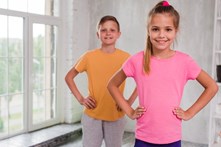 Moving and exercise can help you stay healthy. It also helps with your mood and sleep. Here is some information about how much exercise you should be doing.
Moving and exercise can help you stay healthy. It also helps with your mood and sleep. Here is some information about how much exercise you should be doing.
Gov.uk explain the physical activity needed for general health benefits for all children and young people.
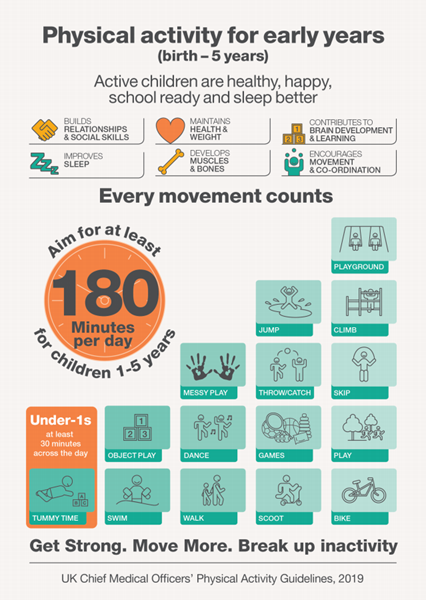
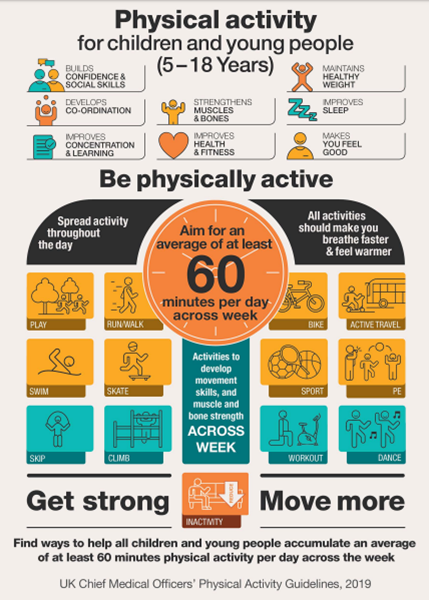
Keeping physically active brings many health benefits. For children, regular physical activity is important for growing up to have strong bones and muscles, maintaining a healthy weight and building their confidence. Click on the links below for ideas of keeping active:
A Local Information System for Scotland (ALISS) helps signpost people to community resources and enables communities to contribute information about the resources they have to offer e.g. places, groups, activities, opportunities, events, services. Have a look on their website to find a local resource near you.
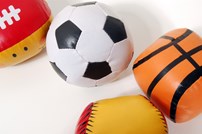
Ball skills are a very complex set of skills to learn. Children who find ball skills difficult need lots of practice so vary the activities you try so that they don’t get bored. Always finish on a positive note with them having some success to avoid frustration. You might need to make the activity easier to allow them to succeed.
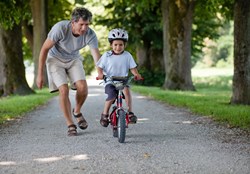 Learning to ride a bike is a complex task involving balance, motor skills and visual skills. There are lots of community resources that can help you teach your child how to ride their bike. It can be helpful to start with a balance bike.
Learning to ride a bike is a complex task involving balance, motor skills and visual skills. There are lots of community resources that can help you teach your child how to ride their bike. It can be helpful to start with a balance bike.
If your child continues to find this challenging check our strategies for learning to ride a bike. This technique takes time, but the idea is that your child gets a sense of achievement from mastering each step one at a time.
 Bike for Good refurbish, repair and teach communities how to maintain bicycles; once you have the skills a bike is for good. They use the bike to do good actions, improve the environment, teach skills and improve mental and physical health.
Bike for Good refurbish, repair and teach communities how to maintain bicycles; once you have the skills a bike is for good. They use the bike to do good actions, improve the environment, teach skills and improve mental and physical health.
Locations
Bike for Good Glasgow West
65 Haugh Road
Glasgow
G3 8TX
Tel: 0141 248 5409
Bike for Good Glasgow South
539 Victoria Road / Langside Lane
Glasgow
G42 8BH
Tel: 0141 261 1609
 Free Wheel North is a cycling development charity working towards creating a fairer, healthier society by enabling people of all ages and abilities to cycle as part of their everyday life.
Free Wheel North is a cycling development charity working towards creating a fairer, healthier society by enabling people of all ages and abilities to cycle as part of their everyday life.
Location
Glasgow Green Cycle Centre
Templeton Street
Glasgow City Centre
G40 1AT
Tel: 0141 551 8869
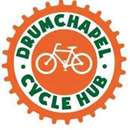 Drumchapel Cycle Hub are a volunteer-led community project supported by the Drumchapel Sports Hub and a community cycling club affiliated with Cycling UK.
Drumchapel Cycle Hub are a volunteer-led community project supported by the Drumchapel Sports Hub and a community cycling club affiliated with Cycling UK.
Location
Drumchapel Sports Centre
195b Drumry Road East
Glasgow
G15 8NS
Tel: 07794935547
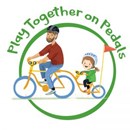 Play Together on Pedals encourages pre-school children and their families to become active, enjoying the fun and freedom of cycling together.
Play Together on Pedals encourages pre-school children and their families to become active, enjoying the fun and freedom of cycling together.
Contact Details
Development Officer Marianne Emordy works for Cycling UK
Email marianne.emordy@cyclinguk.org
Mobile: 07887567578
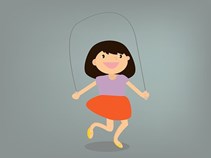 Children learn to jump before they can hop or skip. Skipping is a difficult skill to learn. It involves the legs and arms performing different tasks at the same time. Rhythm and timing are extremely important. Some children find it easier to learn to skip on the spot while others find it easier to learn to skip on the move (e.g. like they are walking). Try both to see which your child finds easier.
Children learn to jump before they can hop or skip. Skipping is a difficult skill to learn. It involves the legs and arms performing different tasks at the same time. Rhythm and timing are extremely important. Some children find it easier to learn to skip on the spot while others find it easier to learn to skip on the move (e.g. like they are walking). Try both to see which your child finds easier.
Children learn best when they participate in activities that are just the right challenge, not too easy or too difficult. Below are some activities you can try. Try to do them in the order that they are presented in as this will make it easier, but if your child easily achieves one task, move onto the next one.